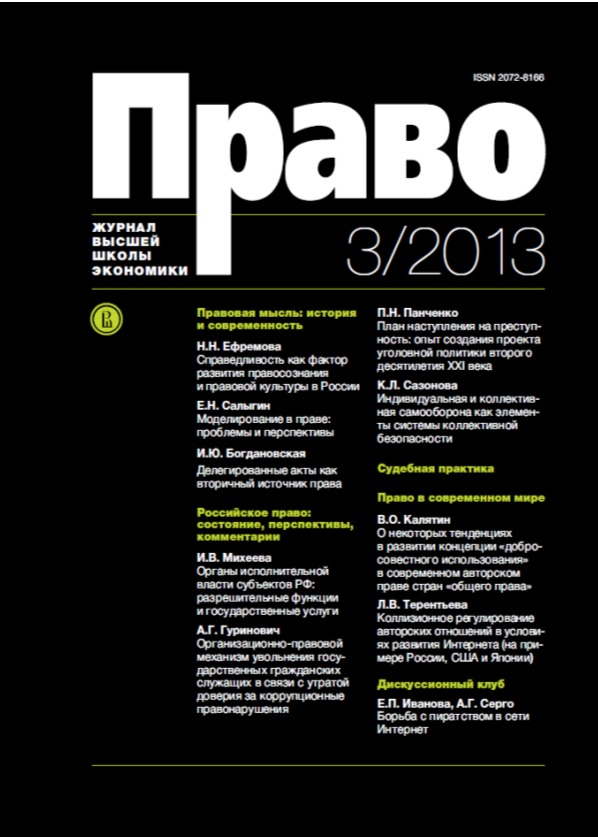Fighting against Piracy on the Internet
Abstract
The article provides a review of legal problems resulting from the protection of copyright to the works placed on the Internet and summarizes the approaches aimed to solve these issues. Despite the rapid development of the legislation in the area concerned, the gap between this legislation and technological progress and consequently, low efficiency in the fight against exclusive right violators are obvious. This problem is not exceptionally Russian as it actually affects all the countries in the world with advanced information and telecommunication networks. However, now it is clear that an optimal balance between the interests of copyright holders and users can be reached only as a result of taking reciprocal measures aimed at creating honest and transparent forms of cooperation. Attempts to influence one cause of the conflict to resolve it is not sufficient and correct. The world experience of developing and implementing alternative means of content delivery, taking into account the needs of all Internet-content market members, is one of the first important steps on the road to the balance between the interests of right holders and users. Today, it is obvious that the methods of monetization of the works, used by the owners previously, have become obsolete. Relations between right holders and users are in the process of the inevitable reform, but what will it be - revolution or evolution? The material is based on both the analysis of the existing theoretical legal approaches to solve these problems, and judicial practice that has currently formed its view on some of the questions considered.
References
Konstitutsiya Rossiiskoy Federatsii. Prinyata vsenarodnym golosovaniem 12 dekabrya 1993 goda [Constitution of the Russian Federation. Adopted at referendum 12 December, 1993].
Grazhdanskiy kodeks Rossiskoy Federatsii. Chast' pervaya ot 30.11.1994 no 51-FZ. (Rossiskaya gazeta no 238-239, 08.12.1994). Chast' tretya ot 26.11.2001 no 146FZ (Rossiskaya gazeta no 233, 28.1.2001). Chast' chetvyirtaya ot 18.12.2006 no 230-FZ (Parlamentskaya gazeta, no 214-216, 21.12.2006) [RF Civil Code].
Federalnyi zakon ot 02.07.2013 187FZ O vnesenii izmeneniy v otdel'nye zakonodatel'nye akty RF po voprosam zashchity intellectual'nykh prav v informatsionno-telekommunikatsionnykh setyakh (SZ RF 2013 no 27 St.3479). Sovmestnoe postanovlenie Plenuma Verkhovnogo suda RF I VAS RF ot 26.03.2009 no 5/29 O nekotorykh voprosakh voznikshykh v svyazi s vvedeniem v deistvie chaste chetvyortoi GK RF [Federal Law of 02/07/2013 no 187-FZ On Amendments to Certain Legal Acts of the RF on Protecting Intellectual Property in Information and Telecommunication Nets].
Postanovlenie Prezidiuma VAS RF ot 23/12/2008 no 10962/08. [Decision of RF VAS Presidium of 23/12/2008 no 10962/08].
Postanovlenie FAS Moskovskogo okruga ot 11/05/2010. Po delu no КГ-А40/3891- 10 no А40-89751/08-51-773 [Decision of FAS of Moscow District of 11/05/2010 on case no КГ-А40/3891-10 no А40-89751/08-51-773].
Postanovlenie Devyatogo arbitrazhnogo apellyatsionnogo suda ot 13/09/10 po delu no А40-75669/08-110-609. [Decision of 9th Arbitration Appeal Court of 13/09/10 on case no А40-75669/08-110-609].
Danilina I. (2010) Informatsionnie otnosheniya v seti Internet po povodu ob'ek-tov avtorskikh prav [Information Relations on the Internet as to the Objects of Intellectual Property]. Zakony Rossii: opyt, analyz, praktika — Laws of Russia: experience, analysis, practice. no 4, pp. 51-56.
Igumnova E. (2010) Avtorskie I smezhnie prava [Copyright and Joint Rights]. EZh Yurist 2010, no 24.
Makryashina A., Kosterev V. (2010) Internet-piratstvo privedyot k sokrashcheniyu 1,2 mln rabochykh mest k 2015 godu [Internet Piracy will get to Close Down 1,2 mln Jobs by 2015]. Available at: http://www.infox.ru/hi-tech/internet/2010/03/18/Intyernyet_piratstvo.phtml (accessed 08.06.2013)
MGUA (2010) Pravovye Problemy Prava Intellektual'noi Sobstvennosti [Legal Issues of Intellectual Property]. Materials of Round Table. Vologda: Kutafin Campus Vologda.
Palamarchuk A. (2010) Zashchita isklyuchtel'nykh prav na rezul'taty intellektual'noi deyatel'nosti v seti Internet [Protection of Exclusive Rights to the Results of Intellectual Activity on the Internet]. Zakonnost' — Legality, no 7, pp. 15-21.
Serb-Serbin R. (2010) Nezakonnoe Rasprostranenie Kontenta v Seti: Ishchem Pravykh I Vinovatykh [Illegal Distribution of Content on the Internet: in Search of Guilty and Unguilty]. Available at: http://www.infosud.ru/judicial_analyst/20101227/25143098.html (accessed 18.05.2013)
Voinikanis E. (2010) Voznagrazhdenie v forme nenalogovogo platezha [Remuneration in the Form of Nontax Payment]. Paper presented at the 12th International Conference Pravo I Internet. [Law and Internet]. Moscow, 19 November 2010. (in Russian)
Copyright (c) 2013 Law Journal of the Higher School of Economics

This work is licensed under a Creative Commons Attribution-ShareAlike 4.0 International License.


















